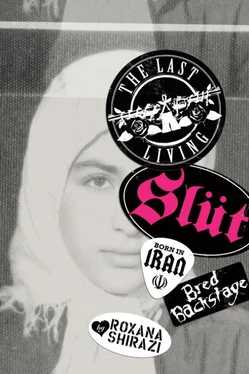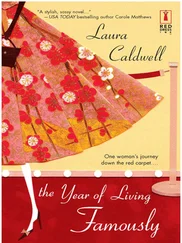“Put some panties on! Bad girl!” my grandmother or mum would scold in a loud whisper if they caught me. But I loved the feeling of my body exposed in the water and the sun. I wanted to be free.
When the adults awoke from the siesta, it was time for early evening tea, which was exactly like breakfast. In the summer we enjoyed tea in the garden. Then, in the evening, everyone put on fancy clothes to go mehmooni , visiting relatives’ houses to eat, dance, and have a good time. My mother usually took me to see her sister and my cousins in Foozieh, a seedy part of town that smelled like sewage. We stood by the road and shouted our destination at the orange taxis speeding by—the customary way to flag down a cab—until one stopped and we climbed in, sharing a ride with others headed that way.
Most of the men in my mother’s family were political prisoners, leaving the women alone with their children and forced to stay with their parents or in-laws. My aunt’s husband was a political prisoner along with my uncle and my mother’s cousins. Day and night, the adults would sit talking about the political situation. In the 1970s, Iran emerged as one of the oil giants of the Middle East and the Shah established himself as a monarch, with a plan to Westernize our society. By 1973, Tehran was considered one of the world’s most innovative capital cities, with religion operating on the fringes. Scores of villagers and farmers filtered into Tehran to take advantage of the prosperity promised to them by the Shah. But government corruption ensured that the promised trickle-down of wealth only pooled around government officials and friends of the Shah. The gap between rich and poor rapidly grew wider.
Soon, due to a lack of jobs and housing, an abundance of shantytowns, teeming with disenfranchised villagers and farmers, sprouted up around Tehran. As unrest spread through the citizenry, the ruling body hardened into an even more stringent military dictatorship. The Shah imprisoned anyone with opposing views, and stripped away civil liberties and the right to strike. Freedom of speech and the press were eliminated, and anti-Shah activity was punishable by torture, imprisonment, and even execution. The Shah activated his own secret police—the savak—who ramped up terror by raiding homes believed to house anti-Shah literature and arresting all suspects encountered on the way.
In this turbulent political state, dozens of resistance groups sprang up, many of them with multiple branches. Their ideologies may have differed in their particulars, but they were united in one objective: to overthrow the Shah’s military dictatorship and bring freedom and social equality to the people of Iran.
As public unrest and anti-Shah demonstrations increased, so did the gunfire in the streets. My grandmother’s house began to turn into a base for intensifying political activity. The savak raided houses in our neighborhood daily. And life became more hazardous.

I Soon Realized that It was Opium that was The Love of My Father’s Life, and that He’d Gradually Become Bored of Me.
Iwasn’t aware of what a father was until I began to notice that other children had a man as another parent and I did not. There was a tall, thin, quiet man with tinted glasses and a mustache who came to visit me once in a while. He was nice to me, but I didn’t know how he fit into the tightly woven pattern of my family. He stuck out in my family like a salted pretzel stick in a candy store. He was unlike anyone I had ever met.
Whenever my father visited our house, I’d grow shy and hide from him. My grandmother was nice to him, but I noticed that he and my mum hardly spoke. It didn’t cross my mind to wonder why he didn’t live with us the way other Daddies lived with Mummies. I figured he must have liked me since he made an effort to talk to me. But my childhood instinct told me that he did it out of obligation, not because he wanted to. So I scowled and didn’t say much back to him.
He was good-looking and distant, like a film star. And he was quiet and always seemed unhappy. So I put on my best dresses hoping he would notice and want to spend more time with me. As I became aware that he was my father—my daddy, someone who should love me—I acted coy and dressed prettily because that’s how girls got the things they wanted. He would pick me up for scheduled visits and take me to the nearby park, Haft Hoz (Seven Lakes), to buy cooked liver from the street vendors and go on the mini Ferris wheel. Once, when my stomach was upset and I had diarrhea, he took me to the bathroom; I was very embarrassed that he should see me in such odious circumstances.
Often, my father took me to his sister’s house nearby, where he lived with his mother and younger brother. I remember thinking that my three cousins were noisy and naughty children, not refined at all. But I loved playing with my girl cousin, dressing up in chic ladies’ dresses and heels. Still, I never smiled in the photos we took on those visits. “Who’s this girl here scowling like a donkey?” my father would drawl, pointing at me in the pictures. It was the only time I saw him express anything close to emotion.
I adored my father’s family: my aunts and uncles and cousins. They were lovely, kind, and fun to be around. But I just didn’t feel like smiling. I was a bad child, like my dad said. My father’s family enjoyed simple things, like watching movies and eating food together. It was an alien Disneyland. Simple pleasures and laid-back indulgences constituted the family foundation, unlike my mother’s home where everyone was a political activist.
Though my father’s visits came less and less frequently with time, I still waited for him at the door, ready in my best flowery cotton dress, my tight ringlets freshly shampooed and clipped out of my face. When he didn’t show up, I would chastise myself. “I’m not pretty enough,” I’d think. “I’m too boring for him.” Eventually, my grandmother would shout at me to give up and come in.
“He probably got ill or something,” she’d say. “Maybe there was an accident.”
“But when he telephoned, he said he was coming. He will come.” I believed in him, because surely my daddy was a nice man. He had to be. I never cried at the huge wall of hurt and disappointment that secretly overwhelmed my heart when this man who was supposed to be my father didn’t show up or call when he promised. And on those rare occasions when he did, he was grouchy and silent.
I soon began overhearing the adults talking about opium, and how it was something that men did—especially older men, like taxi drivers. I soon realized that opium was the love of my father’s life and that he’d gradually become bored of me, because I was a nerdy girl who was not fun.
But my father wasn’t the only adult in my life, and I found comfort in other adults, who often told me I was a pretty girl. I began to seek attention from other males—boys my own age or older relatives. I grew determined to make them like me by becoming the most beautiful girl they had ever seen. This soon formed the backbone of my sense of self. It became my armor and made me happy.
The less I saw of my father, though, the more I longed for him. I closed my eyes and fantasized that he would pick me up and smile, take me to interesting places and laugh. He became a fantasy figure, like the seasoned movie star he resembled. Eventually, though, I grew tired of waiting for him, and my fantasies turned to the soldiers on television.
The first time I masturbated was winter, just before the revolution. I was about five years old, and there was a constant stream of men in uniforms invading my daily life. The spectacle of the savak, who terrified me, gave me a delicious dark thrill that hit me in my gut in a way it wasn’t supposed to. I found myself attracted to the soldiers on the streets and on TV, parading with authority, with power.
Читать дальше













